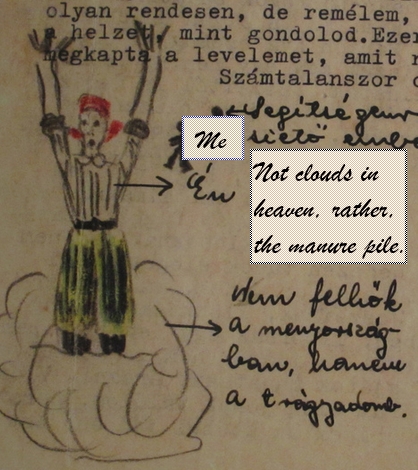Do you know how I would describe the actions of a powerful black woman against a defenseless fraulein, if I were, like, not racist at all? CANNIBALIZATION. *[I am wrong here–please read the ETA for why.] Buh–huhh? What now? WTF? Cannibalization, are you out of your ever-lovin’, blue-eyed, mind; this is part of your defense against people thinking you’re racist? Probably that’s just from laying down with the Daily Mail and getting up with pubic lice, as the venerable British saying goes. Oh, what’s this you say, over here? The original article in German? “Sie ist so mächtig, und ich bin bloss eine Verkäuferin. Ich habe niemandem etwas zuleide getan. [Sniffles audible–ed.] Ich verstehe auch nicht, weshalb sie das so gross im TV ausschlachten muss.” My German is rusty, so first I thought, that’s just some form of ausschlagen and the Daily Mail are being a bag of racist dicks per the uge’, but–naw, this is–oh, no, I can’t eve–God, why? For real, cannibalize! Apparently Swiss people are so racist, this is how you can explain you’re not racist! Also, by explaining that you can’t be racist because you’re Italian! [Raises hand, tentatively, ‘excuse me, I–] And, erm, this explanation works great for British people, apparently. And American Gawker readers eat this shit up with a spoon! OMG! Racism is the Cronut for the summer of this August you guys! CANNIBALIZE. No, for real. Cannibal.
I started writing the other day because I wanted to talk about how John’s question, “when did it stop being acceptable to say mind-bogglingly racist things in public?” is half a good question and half a misleading one. In politer society certain awful things were never acceptable to say. As time has passed the band of “can say ‘x’ and retain future political career” has been getting narrower, and higher, and that’s a good thing. But on the other hand, people who were racist never really stopped much being racist, or saying and doing stupid racist stuff. One thing that remained true was that certain words and phrases continued to be considered low-class and redneck even as many other whites remained very racist indeed. Thus we have the continual problem of rural whites doing something obviously racist (like the MO rodeo clown show (I am pretty certain this applies to their state legislature but have not done the research)) and then they are stuck simulaneously saying ‘that wasn’t racist’ and ‘you’re the real racists, playing the race card,” and “AIDS is thinning the herd in Africa and among blacks here in America–I call it natural selection for our country–no racism.” [Promise for real quote which I have cleaned up and can’t be bothered to find among 4,000 new ones on the rodeo article.]
Everybody on the internet is dissecting this thing 12 ways to Sunday and why? Why? Because they’re sexist and racist, I’m so flattered that y’all even asked! No, but a boringly obvious thing happened: A store attendant in Zurich didn’t recognize her (fine), so she treated Oprah like crap because she was racist. Yes, racially prejudiced against black people, is where I’m going with this. R-A-C-I-S-T. OMG, and yet an Italian person! Totally unbelievable, right, be… Later, Oprah was asked in an interview about the last time she experienced racism or racial prejudice. She said that because of her current social position it’s rare, but that when she’s the only minority and the only woman in a huge boardroom she still can tell they think she doesn’t belong. Then she told this story and that it had happened in Zurich, while she was out sans entourage or fake lashes but with [gestures to face] “my full Oprah on.” She did not name the boutique (this detail was ferreted out by gossip site TMZ) or the shop assistant (who is still anonymous.) THE END. CANNIBALS.
Please, please, go read the comments on the Daily Mail, and at Gawker, and elsewhere, and think, ‘these are my people over here. This is who I’m all about identifying with in this situation.’ Y’all know to whom these comments are directed, ye “I’m Richard Dawkins, except about all of left politics, fnarf! Sucks to be you, women and most non-white people, unless you’re willing to take part in the matinée, evening and sometimes midnight showings of the ‘Richard Dawkins is Right About Everything Finger Puppet Theatre'”-types. You begin to cease to interest me.
In conclusion, CANNIBALIZE.
*ETA: My German being, as I said, not the greatest, I trusted my dictionary for this one word and got only “cannibalize,” but I didn’t read carefully enough and get examples. I assumed the Daily Mail was just completely making things up, and my shock at seeing them (apparently) be right overrode my lexical caution. I was wrong. Commenter js suggests and commenter David Woodruff pretty well confirms, that this is “cannibalize” in the “we cannibalized the three crashed planes for enough parts to get the fourth off the ground” sense and not the “we stood around with bones in our hair saying ‘ooga booga’ while stirring a huge cast-iron pot with a skinny Italian woman inside, and we had it on a nice simmer, with some celery and carrots and onion and bay leaves in there” sense. So, we can continue to marvel at the racial cluelessness of a woman who argues that she cannot possibly be racist because she is Italian, and you should read the Daily Mail article carefully to see why her story is implausible in every detail, but I was wrong in my central accusation that she was calling Oprah a cannibal.
Nonetheless you all should continue to read the comments on the article, at, perhaps most surprisingly, Gawker, where the “cannibalize” quote is taken for granted and yet most everyone, every, everyone takes the shop assistant’s side. What reason does Oprah have to lie? How many reasons does this other woman have to lie?

